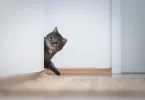Cats are curious creatures, especially when it comes to food. While it might be tempting to share your snacks with your feline friend, not all human foods are safe for cats. In fact, some foods can be toxic and lead to severe health issues. To keep your cat safe and healthy, it’s essential to know which foods to avoid. In this article, we’ll cover 10 foods that are unsafe for cats and highlight the foods that cats can eat safely.
1. Chocolate

Chocolate is one of the most well-known toxic foods for both cats and dogs. It contains theobromine and caffeine, both of which are harmful to cats. Even small amounts can lead to symptoms like vomiting, diarrhea, tremors, and, in severe cases, seizures. Always keep chocolate far out of your cat’s reach.
Safe Alternative: Opt for specially made home-made food for cats using cat-safe treats like cooked chicken or turkey instead of chocolate.
2. Onions and Garlic

Onions, garlic, and anything in the allium family are dangerous to cats. They can damage red blood cells and lead to anemia. Even small amounts of cooked or raw onion or garlic can cause problems over time.
Safe Alternative: Cats enjoy plain meat without seasoning, making human foods cats can and can’t eat easy to manage. Avoid giving them any dishes with onion or garlic flavoring.
3. Grapes and Raisins
Grapes and raisins may seem like a harmless snack, but they are toxic to cats. While the exact substance that causes toxicity isn’t well understood, even a small amount can cause kidney failure in cats.
Safe Alternative: Offer your cat a slice of apple or some cooked vegetables like carrots. These are examples of human food safe for cats when given in moderation.
4. Alcohol
Alcohol is extremely dangerous for cats, even in small amounts. It can cause vomiting, diarrhea, difficulty breathing, tremors, and, in extreme cases, death. Make sure all alcoholic beverages are out of your cat’s reach.
Safe Alternative: Stick to water and feline-friendly broths when it comes to beverages for your cat. No human drinks are safe for cats except for plain water.
5. Raw Fish

Though it might seem natural to give a cat raw fish, it can be dangerous. Raw fish contains enzymes that can destroy thiamine, a crucial B vitamin for cats. A deficiency in thiamine can cause neurological issues, such as seizures or comas.
Safe Alternative: Cooked fish is a much safer option for your cat. If you want to offer raw foods for cats, ensure it’s high-quality and meant specifically for cats, like raw meat formulated for feline diets.
6. Dairy Products

Despite popular belief, most cats are lactose intolerant. Milk, cheese, and other dairy products can cause digestive issues, including diarrhea and stomach upset.
Safe Alternative: If your cat loves dairy, try lactose-free cat milk, which is specifically designed as a human food cats can eat without causing digestive problems.
7. Caffeine
Caffeinated drinks such as coffee, tea, and energy drinks are dangerous for cats. Caffeine can lead to hyperactivity, rapid breathing, heart palpitations, and muscle tremors. In severe cases, it can be fatal.
Safe Alternative: Stick to water or broth made specifically for cats. No caffeinated human food safe for cats should ever be given.
8. Raw Eggs

Raw eggs can carry bacteria like Salmonella, which is dangerous to both humans and cats. Additionally, raw egg whites contain an enzyme that interferes with biotin absorption, leading to skin and coat problems in cats.
Safe Alternative: Cooked eggs, served in moderation, are a nutritious and food cats can eat safely.
9. Bones
Whether cooked or raw, bones are hazardous for cats. They can splinter and cause internal injuries or get lodged in the throat, leading to choking.
Safe Alternative: If your cat enjoys chewing, provide them with cat-safe dental chews. These are safer than bones and won’t cause harm.
10. Xylitol (Artificial Sweeteners)

Xylitol is a common sweetener found in sugar-free gum, candies, and some baked goods. While it’s safe for humans, it’s highly toxic to cats, causing a rapid release of insulin, which leads to hypoglycemia (low blood sugar). This can result in vomiting, loss of coordination, and seizures.
Safe Alternative: Always avoid foods containing xylitol and opt for homemade food for cats using natural, cat-safe ingredients.
What Human Foods Can Cats Eat?
Now that we’ve covered the toxic foods, you might wonder, What human foods can cats eat? Here are some safe options to consider:
- Cooked Meat: Chicken, turkey, and lean beef are great food that cats can eat in moderation. Just be sure it’s plain and unseasoned.
- Cooked Fish: Salmon and tuna, when cooked, can be a treat for cats but should not make up their regular diet.
- Vegetables: Carrots, peas, and zucchini are some veggies that can be added to a home-made food for cats.
- Fruits: Small portions of apple or melon are human foods safe for cats, but always remove seeds and pits.
Conclusion
Cats can be picky eaters, but it’s essential to know which foods are safe and which are toxic. By avoiding the dangerous foods listed above, you can ensure your cat stays happy and healthy. If you want to incorporate human food cats can eat into their diet, always check with your vet and stick to foods that are known to be safe. Keep your feline friend away from these toxic foods, and you’ll be well on your way to providing them with a long and healthy life.
Remember, when in doubt, always consult your veterinarian before introducing new foods into your cat’s diet, especially human foods cats can and can’t eat can vary greatly. Keep your cat safe and stick to a healthy, balanced diet designed for their needs!





